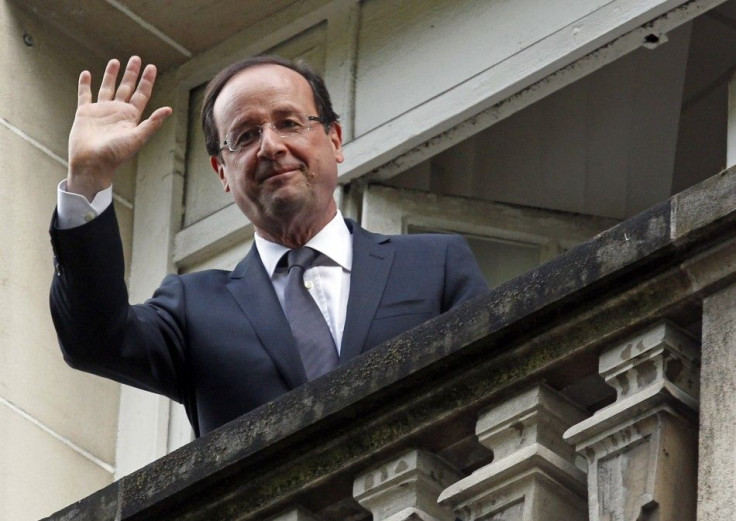Centrist in Disguise: How Anti-Austerity Can France's Hollande Be?

Only hours after the polls closed Sunday, French President-elect Francois Hollande wasted no time in attacking the Franco-German austerity consensus.
He threw down the gauntlet to German Chancellor and fiscal enforcer Angela Merkel, triumphantly declaring: Europe is watching us. Austerity can no longer be the only option.
The moment that I was announced president, he added, I am sure in many European countries there was a relief, hope at the idea that at last austerity is no longer inevitable, and my mission is to give to European construction the dream of growth.
But while he may have narrowly convinced France, analysts are unsure Hollande can persuade the rest of Europe, let alone a resolute Germany, to abandon the austerity juggernaut.
Indeed, if one delves beneath the lusty rhetoric, Hollande's plans are not quite as socialistic as he would have many of his supporters would believe.
Sure, there will be the usual left-wing concessions for his supporters, as domestically Hollande has already pledged to create 60,000 new jobs in education, while at the same time boosting opportunities for the young.
In a direct attack on his predecessor's deeply unpopular 2010 pension reforms, he has also pledged -- at least for some workers -- to roll back the retirement age from 62 to 60.
But in a nod towards fiscal responsibility, he has also promised a €100 billion savings plan, and a balanced budget by 2017 - a feat not achieved in France for the past 30 years.
There is one rather large catch, however.
Hollande needs to return France to growth, and quickly, or his plans will fail.
And with half his savings expected to come from higher taxes on the rich and corporations, he has been criticized at home as a typical tax-and spend left-winger, more likely to damage France's reputation in international markets than dig the country out of its public debt, which now stands at an alarming 87 percent of GDP.
Far from overseeing a dramatic reversal of the German Fiskalpakt, commentators expect Hollande to become a prisoner of circumstance, doomed to talk big but deviate little from the austerity program.
His socialist ideology will not stop the reforms, said Laura Gonzalez, assistant professor of finance and business economics at Fordham University in New York.
Hollande, like [ex-Premier Jose Luis Rodriguez] Zapatero did in Spain, will have no choice but to implement reforms and control the deficit.
The only change will be in stressing growth strategies, not only austerity measures, like Merkel rushed to clarify last week.
Others, however, doubt Hollande can deliver on his promises at all.
Many would question whether he has France on the right path, said Desmond Lachman, a fellow at the American Enterprise Institute, a conservative-leaning Washington think tank.
He is reminiscent of [former Socialist President] Francois Mitterrand, who was forced to do a U-turn when his policies didn't work.
Mitterrand, the first Socialist Party member to become president under the Fifth republic, embarked on his own course of radical economic reforms in the early 1980s, including a spate of nationalizations.
But, with the economy in crisis, after just two years he was forced to reverse course.
Hollande is problematic for France in two ways, Lachman added.
Where is he taking France... and where is this taking the French-German relationship?
While not there yet, France runs the risk of becoming associated in the markets' minds as potentially another Italy.
But, while Hollande is in for severe disappointment if he hopes to renegotiate the Berlin-backed Fiskalpakt, he may yet be able to influence an implacable Merkel.
Throughout the campaign, he has gathered a following of European leaders behind the banner of continent-wide job creation and growth policies and, more specifically, increased lending by the European Investment Bank and the redeployment of unused EU cohesion funds to stimulate growth.
This is something Charles Kupchan, a senior fellow at the Council on Foreign Relations, thinks is the most likely outcome when the pair meet in the near future.
I don't think he is going to come in and break a lot of china... he's a centrist and a pragmatist, said Kupchan.
He's got a double game on his hands here, keeping one eye on the French economy and how much stimulus the market will bear, and the other on Merkel and how far he can push her.
The austerity measures in place will remain in place... but what you will see is Merkel saying, 'stick to the fiscal pact, stick to the fiscal constraints but let's see what we can do for a workaround'.
Whatever the outcome, we will not have long to wait. Hours after his election was confirmed, the new French president was cordially invited to Berlin, with Merkel adding she was sure the two would work closely together.
But while the two are sure reach an agreement on growth that runs parallel to austerity, one thing's for sure: The days of the Merkozy alliance are gone.
© Copyright IBTimes 2024. All rights reserved.











